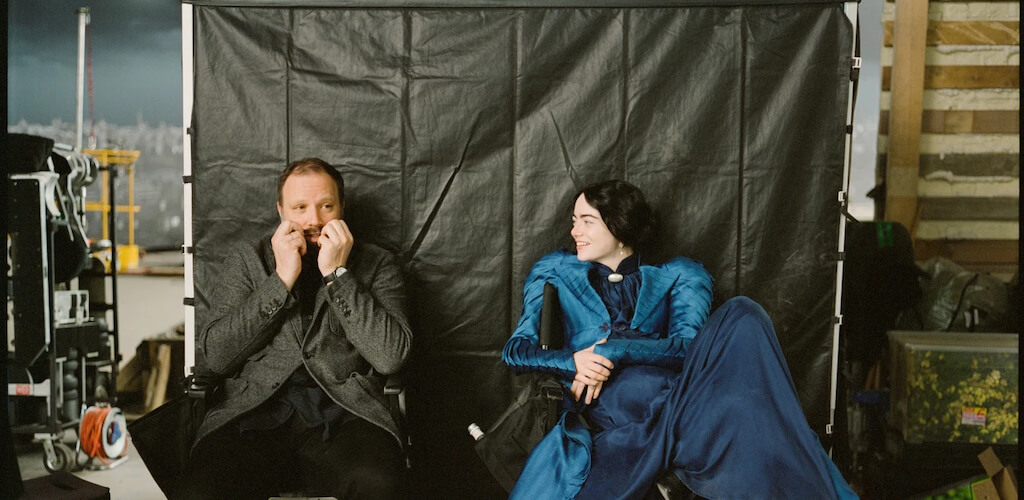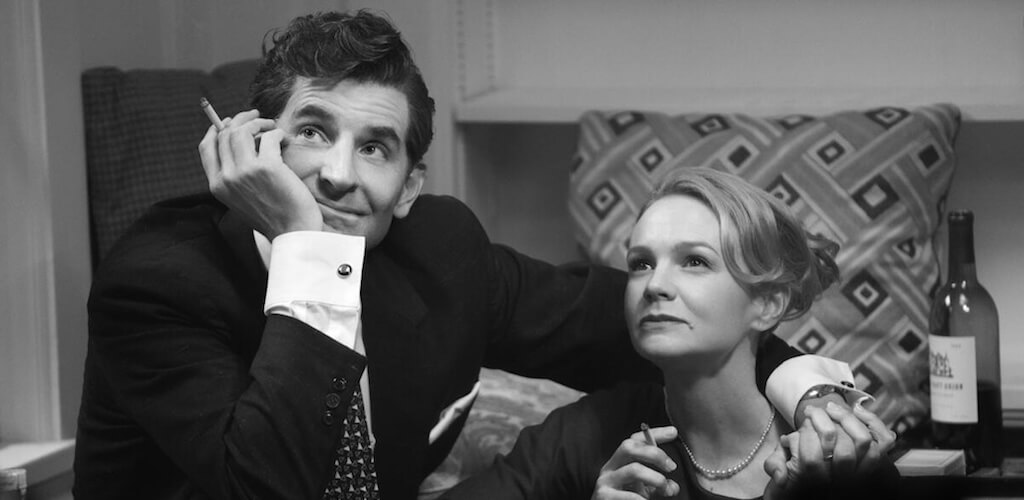Welcome to part two of our Oscar picks! Here’s part one if you missed it: Oscars 2024 – Who Should Win? (Part One)
Remember, these aren’t the movies that will win, these are the movies that should win. Here are our picks for the most coveted categories of the night…
Best Actress

Lily Gladstone — Killers of the Flower Moon
Annette Bening — Nyad
Sandra Hüller — Anatomy of a Fall
Carey Mulligan — Maestro
Emma Stone — Poor Things
Lily Gladstone is the best thing about Killers of the Flower Moon, but she’s not in the movie long enough to justify a Best Actress nomination. I’d love to see a new version of the film with her front and center as she should have been. What we’re left with, however, is still an incredible performance. Gladstone’s Mollie exudes strength without saying a word. And when she does speak, her words are few and packed with power. So why does she allow herself to be taken advantage of by Ernest? Because she loves him, and that’s the complexity of her character. Mollie is a tough, independent woman, but she also just wants to be loved. The little girl inside of her sees the little boy inside of Ernest and that’s all that matters for a season. But her world is a cruel one filled with wicked men and wicked schemes. Mollie deserved so much more. She also deserved to be in every scene of this movie.
Annette Bening isn’t afraid to be annoying, and that’s what makes Diana Nyad such a fascinating character. We’re compelled by her tenacity to accomplish the impossible, but we also wish she would chill out and let other people have the spotlight for a change. She sucks people into her orbit and then leaves them exhausted once they realize Diana only knows how to be the center of her universe. But maybe that’s what greatness requires. Diana has her eyes fixed on her goal. That’s all that matters. Everything else is a distraction, even people. And yet, she needs them. It’s a lesson she learns by the end of the movie, but probably will never learn completely. Bening tosses aside any semblance of Hollywood vanity and transforms into this character with an intensity we can’t look away from. She and her co-star, Jodie Foster, give two of the best performances of the year side-by-side, proving that great actors only get better with age.
We’re never quite sure what Sandra Hüller is thinking and that’s the genius of her performance. This is the story of a woman accused of murder. Did she do it? We’re never certain from one scene to the next. How can we see what’s truly going on behind anyone’s eyes? Even people we’ve known our whole lives. It’s as if Hüller plays both sides simultaneously — one version innocent, one version guilty. She can be sweet and affectionate, but also self-centered and manipulative. So can we all. The justice system forces us to pick a side, but even our worst actions aren’t the final verdict on our lives. Hüller locks into this ambiguity and makes us doubt everything. She did the same thing in her other standout performance of 2023 in The Zone of Interest as a normal housewife raising her kids with Auschwitz looming in the background. Either one could have netted her this nomination. She played them both in the same year.
Carey Mulligan is only 38, but it feels like we should already be giving her a lifetime achievement award. She picks great scripts and always delivers. Every performance feels like her best yet, but her turn as Felicia in Maestro actually might be. Felicia knew what she was getting into when she married Leonard Bernstein, both his obsession with music and his unconventional lifestyle. Unfortunately, they still took a toll over the years. Her story is sad, but Mulligan doesn’t play her like a victim. Felicia made her choices and spent her life living with the consequences. She gets some of the best lines of the script, but the most unforgettable moments are the long, slow close-ups of her face. In one of them, Mulligan barely says a word as the camera gets steadily closer. Her face says it all and I cried like a baby. That’s great acting.
Bella in Poor Things is an actor’s dream. She begins with the brain of an infant and develops into a full-grown woman. It’s the entire range of human experience in a single character. You can imagine Emma Stone’s excitement when she read the script. She knew this was a once-in-a-lifetime opportunity, and on Sunday she’s going to win an Oscar for it. Stone has always been talented, but this is another level. There’s a physical component in the way Bella hobbles around as her body struggles to sync up to her brain. There’s a vocal element in her unique accent and delivery. And there’s the emotional maturation that takes place over the course of the film. Stone gets to be immature, quirky, ignorant, funny, sexy, strong, commanding, and wise all within the same character arc, and every note of the journey is pitch-perfect. We clearly underestimated the girl from Superbad, but we’ll never do it again. Stone deserves her Oscar and all the exciting doors it will open. What if her best is yet to come?
Best Actor

Jeffrey Wright — American Fiction
Paul Giamatti — The Holdovers
Colman Domingo — Rustin
Cillian Murphy — Oppenheimer
Bradley Cooper — Maestro
It’s a credit to the strength of this category that Jeffrey Wright is at the bottom of the pack for American Fiction. This is easily the role of his career. He’s in every scene and he plays Monk perfectly. This is a man who’s had enough. Enough pretending. Enough pandering. Enough. As someone in my late 30’s, I can relate. As the disappointments pile up over a lifetime, the path to cynicism grows more appealing by the day. But in a twist of irony, it’s just when Monk gives up, that he stumbles upon his greatest success… which only makes him more resentful. Monk isn’t an easy person to be around, but Wright gives him enough sardonic charm to keep us invested. And when he’s around his family, his humanity shines through most. I love Monk’s first meeting with his sister. He keeps up his grumpy facade, but once he’s in the car with her, we see him smile for the first time despite himself. At the end of the day, he’s just the older brother who takes himself too seriously. His family puts him in his place in a way no one else can and he respects them for it. Wright has been popping up in character roles for years, but this is greatest showcase for his talents to date. In any other year, this would have been his Oscar moment.
Here’s to Paul Giamatti and all the strange characters he was born to play. He looks cool in real life, but on camera he can be weird with the best of them. Paul in The Holdovers is a grumpy college professor who seems to have written off humanity years ago. And his condition which makes him smell like fish, along with his disagreeable personality, means humanity has written him off right back. Giamatti is perfect for the role because even when he’s being a jerk, there’s something about him that garners sympathy. He’s pathetic in a way that makes us feel sorry for him. I like the night-time exercises he does before getting into bed. He may be a curmudgeon, but he’s still trying. Giamatti deserves this nomination. I can’t believe it’s only his second.
I fell in love with Colman Domingo for his incredible performance as Ali on Euphoria. I had no idea he had such range. Ali couldn’t be more different from Bayard Rustin. Where Ali was quiet and soft-spoken, Rustin is loud and proud. This is someone who knew he was on the right side of history and lived like it. And he did so by putting his life on the line. According to the film, it was Rustin who introduced the principle of non-violence to Martin Luther King Jr. He allowed himself to be beaten for sitting at the front of the bus because he knew there were children watching, and the children could see what the adults couldn’t. But Rustin wasn’t perfect. In his personal life, he had a habit of jumping from one relationship to the next at the expense of his partners. And in his civil rights career, he struggled to learn the art of diplomacy. Why should he back down when his cause is so clearly right? Domingo perfectly captures Rustin’s relentlessness, complete with his toothy grin and impertinence. Domingo got a late start to fame, but I guarantee this isn’t the last time we’ll see him up for an Oscar.
Cillian Murphy has the most haunting eyes in Hollywood, and on Sunday he’ll win an Oscar for them. Whether it’s the hunger of his youth as an academic, the frantic scrambling to make the atomic bomb, or the horrifying realization of what he’s brought into the world, Murphy’s eyes lead the way in Oppenheimer from beginning to end. J. Robert Oppenheimer was far from a saint. He cheated on his wife and reeked of arrogance. Murphy doesn’t shy away from these flaws; he embraces them fully. But he also lends him a dose of humanity that helps us stick with him. Oppenheimer believed he was doing the right thing in making the bomb, and he tried to do right by the people close to him. Murphy’s portrayal of Oppenheimer is intense and unforgettable. I’ll always remember the look on his face in the gymnasium as he imagines the full effects of his creation. The way he oscillates between nationalistic triumph for the crowd and pure horror. His gaunt, ghostly features become a window to a tortured soul.
What more does Bradley Cooper have to do to earn the respect he deserves? Maybe it’s the years he spent in low-brow movies like The Hangover. People can’t seem to take him seriously as an actor, even though this is his second nomination. The conversation leading up to Maestro’s release centered entirely around Cooper’s prosthetic nose which he used to look more like Leonard Bernstein. What a waste of time. The nose looks flawless and it’s beside the point anyway. What matters is that Cooper gives one of the best performances of the year. His portrayal of Bernstein is true character acting. I forgot I was watching Cooper and got lost in the flawed genius of the man who gave us West Side Story. Cooper nails Bernstein’s charm and charisma. He was the center of every room he walked into. But his hedonistic lifestyle came at great cost to his family, especially his wife Felicia. And then there was the music. The best scene in the movie is Cooper directing an orchestra as if his life depends on it. The scene becomes more spellbinding the longer it goes as we see how much of himself Bernstein put into his composing. He sheds literal sweat and tears, and in that moment we realize the true price of greatness. We also realize that Cooper deserves far more talk about his acting than his choice in noses. Give the man an Oscar already. He deserves it.
Best Director

The Zone of Interest — Jonathan Glazer
Justine Triet — Anatomy of a Fall
Martin Scorsese — Killers of the Flower Moon
Christopher Nolan — Oppenheimer
Yorgos Lanthimos — Poor Things
Jonathan Glazer makes many interesting choices in The Zone of Interest. The movie opens on a black screen where only the soundtrack plays. We never see anything that happens in Auschwitz, just the sounds. When a girl ventures into the actual camp, it’s filmed with a heat sensing camera set to eerie music. All fascinating artistic decisions, but to what end? The directing is like an aesthetically pleasing piece in an art museum where the meaning is intelligible. I respect the process and the intention behind it, but walked away wanting more.
Anatomy of a Fall is a movie all about what we see vs. what we don’t see. It’s not a film filled with directorial flourishes, but every decision made by Justine Triet add up to something powerful. I still can’t get over the haunting music that we hear from upstairs in the opening scene when Sandra is being interviewed. Why did her husband Samuel choose to play that particular song on a loop? But my favorite moment comes in the courtroom where a recording plays of a fight between Sandra and Samuel. Triet chooses to show us the actual scene of the fight, but at a pivotal moment she switches back to the recording playing in the courtroom. Just when we think we’ve reached our verdict, the rug gets pulled out from under us again. That’s great directing.
Martin Scorsese deserves an Oscar nomination for directing solely for making the 3 1/2 hour Killers of the Flower Moon interesting from start to finish. That’s a feat few directors could pull off, but it’s what we’ve come to expect from Scorsese. His mastery of pacing is exquisite. Right from the opening scene, we know we’re in good hands. He’s a true auteur, bringing together every element of the film in perfect harmony to tell a good story. He also achieved outstanding performances from his actors which is the director’s primary job. And unlike some, I loved the final scene. I’ll take a radio show to fill in the future over a bunch of paragraphs any day.
There’s a lot to admire from Christopher Nolan’s direction in Oppenheimer. The scenes of the bomb test and the gymnasium speech are some of the best moments of 2023. Nolan has a gift for drawing out tension, and he uses every visual and sonic trick at his disposal for maximum impact. We expect a loud explosion when the bomb goes off, but Nolan chooses hushed silence which is the perfect choice. He even makes hours of people talking in a room more exciting than it has any right to be. I have problems with Oppenheimer, but Nolan’s directing isn’t one of them.
Yorgos Lanthimos is the best director of this category and it’s not even close. Lanthimos is at the top of his game with Poor Things. It’s a director’s showcase. The cinematography pops off the screen — the switch from black and white to color, the use of the fisheye lens, the intricate staging. The set pieces are incredible, both reminiscent of Victorian London and from another world entirely. The makeup and costumes are lush and detailed. And the performances from his actors are Oscar-nominated perfection. We can debate the provocative content and whether Bella’s journey is satisfying, but there’s no question that Poor Things is a technical masterpiece. That makes Lanthimos the best director of 2023.
Best Picture

Oppenheimer
Barbie
The Zone of Interest
The Holdovers
Killers of the Flower Moon
Past Lives
Anatomy of a Fall
American Fiction
Poor Things
Maestro
Oppenheimer is a good movie, not a great one. And it’s certainly not deserving of the Best Picture trophy it will most likely win on Sunday. I would love a page one rewrite to capture what works and make that the whole movie. It’s a three hour film that never has room to breathe. This should have been a movie solely about the making of the first nuclear bomb and the horrific implications that has on the present day. Instead, the majority of the runtime is devoted to legal proceedings about whether Oppenheimer was a communist and whether Lewis Strauss (Robert Downey Jr.) should get a cabinet position. Strauss says at one point “It’s a trial about a trial!” That’s Oppenheimer in a nutshell. What a shame. Because from a technical standpoint, there’s so much to love. The directing, cinematography, music, and acting are all brilliant — they’re just focused on the wrong thing. J. Robert Oppenheimer’s life contains the recipe for a masterpiece, but Oppenheimer isn’t one.
Barbie is an above average comedy that has no place at the Academy Awards. It’s nominated for Best Picture because it made a billion dollars and the Oscars desperately craves mainstream relevance. But that doesn’t mean it’s not a good movie. Greta Gerwig was the perfect choice to take up the reigns, and she infused what could have been disposal entertainment into something clever, hilarious, and subversive. Ryan Gosling and Margot Robbie are perfect, and the script is fun and entertaining. It’s a movie that appeals to everyone, but that’s also what limits it as a work of art. I’d love to see a darker Barbie that takes a true knife to the throat of patriarchy. That wouldn’t make a billion dollars, but it might just be worthy of this nomination.
The Zone of Interest is a fascinating experiment that doesn’t quite work. Jonathan Glazer’s intentions are noble. He set out to make a different kind of Holocaust movie. Schindler’s List and The Pianist have already been made, so what if we focused entirely on a Nazi family camped next door to Auschwitz living their lives as if there weren’t humans being murdered in their own backyard? Glazer never shows a single act of violence against a Jew. We hear the evil, but never see it. I love the concept in theory, but something important is lost in practice. There’s an emotional coldness to the film that feels wrong considering the subject matter. It’s subtle to a fault. I walked away admiring the acting and the artistry, but feeling little. Many will say that’s the point, but I don’t think a movie should ever be a purely intellectual exercise. Especially not one about the slaughtering of six million souls.
There’s a lot to love about The Holdovers. Paul Giamatti is brilliant as usual, and he’s joined by an equally superb supporting performance from Da’Vine Joy Randolph. Director Alexander Payne infuses the movie with an old-school grainy charm and sharp writing. But just when we’re really starting to get somewhere with these characters, the movie ends. I wanted more from the character arcs, especially between Paul and Angus. I can’t help but compare The Holdovers to Sideways, another movie directed by Payne and starring a curmudgeonly Giamatti. Sideways brings its characters on a journey of true transformation. I wanted Paul and Angus to have a moment over wine where they see the beautiful depths beneath each other’s crusty layers. Instead, Payne scratches the surface of change and calls it a day. We should expect more than that from a Best Picture nominee.
For most of its running time, Killers of the Flower Moon is a perfect movie. The 3 1/2 hours fly by as Martin Scorsese takes us on an epic journey that exposes America’s original sin against the Indigenous people. Film is Scorsese’s native language and he knows how to bring every element together for maximum impact. And then there’s the acting. Leonardo DiCaprio shows us a character unlike any we’ve seen from him before, and he’s surrounded by Oscar-nominated turns from Robert De Niro and Lily Gladstone. The cracks only start to emerge in the third act. That’s when the pacing starts to flag and, similar to The Holdovers, the character arcs end before reaching their full potential. In light of the screen time Scorsese gives to Ernest and Mollie, the end of their journey feels strangely rushed. Still, the flaws are minor compared to the overall power Killers of the Flower Moon unleashes on us. The story of the Osage Nation is a profound indictment against white supremacy. We stole and we slaughtered because we could. But history doesn’t forget, and Scorsese makes sure we won’t either.
For a movie about a love triangle, Past Lives is as restrained as they come. There are no big emotional moments where the music swells and the audience cries. And yet somehow, writer/director Celine Song’s subtlety is the movie’s greatest strength. There’s a hushed gravitas that slips under our skin and stays with us long after the credits roll. This is a movie about choices and consequences. Nora could have stayed in South Korea and had a wonderful life with Hae, but she chose New York and found herself married to Arthur. It’s only when the past comes calling in the form of Hae’s visit that she wonders if she made the right choice. But life isn’t a test that we pass or fail, it’s a winding road filled with endless possibilities. Arthur is the movie’s hidden gem. He could have been filled with jealousy at Hae’s disruption, but he lets Nora have her moment with Hae, even allowing them to speak a language he doesn’t understand right in front of him. Arthur knows he doesn’t own Nora. She could leave if she wants to, but he trusts that she’ll stay. Both Arthur and Hae exhibit a gentle masculinity that we don’t see often enough on screen. These are rich, interesting characters colliding in a uniquely un-Hollywood way. In any other hands Past Lives would be boring and unremarkable, but Song has created something magical here. Sometimes less really is more.
Anatomy of a Fall is a classic courtroom drama and mystery centered on the age-old question: did she do it? Sandra’s husband is dead. He fell from the window upstairs. Did he fall accidentally? Did he commit suicide? Was he pushed? We want an answer, but we weren’t there. And when you weren’t there, the truth becomes a choice. We choose to believe Sandra is innocent or we don’t, but we can never know for sure. And that’s what makes Anatomy of a Fall rise above the genre and become something so much more. Director Justine Triet expertly reveals and withholds information, forcing us to re-shift our allegiances multiple times throughout the film. She’s aided by Sandra Hüller’s incredible performance who somehow manages to act guilty and innocent at the same time. Eventually a verdict is read, but is that the truth? Of course not. Because the jury wasn’t there. The most profound shot in the movie is Sandra’s son Daniel watching her mother on TV after the trial is over. We see the panic in his eyes. He thought he knew who his mother was before his father died, but now he’ll never know for sure. Truth is in the eye of the beholder. Could there be a more frightening thought?
The trailers for American Fiction were misleading. They depicted a broad comedy about a struggling black writer who writes a book peddling in racial stereotypes to prove a point only for it to become wildly successful. That’s part of the movie, but what they left out were nuanced characters, profound reflections on adulthood, elegant pacing, natural twists, and a perfect blend of comedy and drama. In other words, all the things that make American Fiction one of the best movies of the year. It’s so rare to discover a great adult movie. Not “adult” in the sense of mature content, but a movie dealing with actual issues adults face. Love, race, family, aging, work, money, success — most movies cover one of these topics; American Fiction covers all of them. There’s an authenticity to Cord Jefferson’s writing that’s refreshing. These characters feel like real people with real problems that you could encounter any day of the week, led by career-best performances from Jeffrey Wright and Sterling K. Brown. And yet, it’s still an entertaining story with a solid beginning, middle, and end. This is Jefferson’s first movie, and it happens to be a masterpiece.
No other movie from 2023 felt more alive than Poor Things. The vision from director Yorgos Lanthimos leaps off the screen. And what a unique vision it is. I’m fairly certain there isn’t another movie about a grown woman who has an infant brain placed inside her head. The plot is absurd, but somehow becomes the ultimate feminist metaphor. Bella is “created” by men in a society run by men, but she breaks free and forges her own path in the world as a strong, independent woman. Emma Stone and Mark Ruffalo give the two best performances of the year in their respective categories, and Lanthimos is the director to beat. His Victorian London has one foot in history and another in fantasy where steampunk ships travel through oceans that look like paintings. The same is true of the words the characters speak. No one used “furious jumping” to talk about sex in the real 19th century London, but it feels just right in this one. The script is smart, satirical, and biting at every turn. Many will be turned off by the abundance of sex and nudity and I don’t blame them. The content is profane, but integral to the story Lanthimos is telling. Poor Things isn’t a movie for the masses, but it’s an unforgettable journey for those willing to take it.
Maestro may not be the technical marvel that Poor Things is, but it’s just as inventive in its own right and ultimately more satisfying. Many still have trouble picturing Bradley Cooper as an auteur, but that’s exactly what he is. Cooper writes, directs, and stars in Maestro just as he did with A Star Is Born. But the former was just his warm-up lap. With Maestro, he’s made a movie that actually deserves to win. That’s Cooper playing the piano in the opening scene as an elderly Leonard Bernstein beneath the most convincing old-man makeup I’ve ever seen. Then we’re off to the past in luscious black and white reminiscent of old-school Hollywood. Cooper blends reality with the fantastical as Bernstein runs around town young and flush with limitless possibilities. And then he meets Felicia. Carey Mulligan is a movie-stealer once gain as the love of Bernstein’s life. But Bernstein was too in love with pleasure (and perhaps himself) to settle for monogamy, which comes at a significant cost to the ones he loves. Cooper isn’t interested in a linear telling of Bernstein’s life. He’s after Bernstein’s essence. And what Bernstein loved above all else was music, which is why his compositions form the soundtrack to every scene. The composing scenes are extraordinary, but it’s the little, unforgettable moments that make Maestro truly great. The choreographed dance scene of one of Bernstein’s musicals, the interview to an author where he bares his soul, the heartbreaking one-shot in a sterile doctor’s office where a diagnosis is revealed, the slow close-ups on Felicia as her face says it all, the off-the-cuff lines like “All you need, all anyone needs, is to be sensitive to others. Kindness. Kindness. Kindness.” This is a film filled with masterful touches from beginning to end. Cooper’s writing and directing is second only to Lanthimos in 2023, and shame on the Academy for not recognizing it. They still only see the man from The Hangover, but he grew up. Cooper is a filmmaker now and he made the best movie of the year.
Join Us…
We’ll be hosting a live discussion on Oscar night and we’d love for you to join us! Follow us on Reddit to get in on the action:




